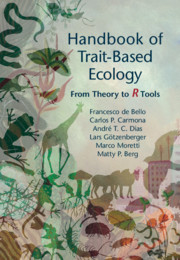Book contents
- Handbook of Trait-Based Ecology
- Handbook of Trait-Based Ecology
- Copyright page
- Epigraph
- Contents
- Preface
- 1 General Introduction
- 2 Trait Selection and Standardization
- 3 The Ecology of Differences
- 4 Response Traits and the Filtering Metaphor
- 5 Community Metrics
- 6 Intraspecific Trait Variability
- 7 Community Assembly Rules
- 8 Traits and Phylogenies
- 9 Effects of Traits on Ecosystem Processes and Services
- 10 Response and Effect Traits across Trophic Levels
- 11 Trait Sampling Strategies
- 12 Applied Trait-Based Ecology
- References
- Index
9 - Effects of Traits on Ecosystem Processes and Services
Published online by Cambridge University Press: 08 March 2021
- Handbook of Trait-Based Ecology
- Handbook of Trait-Based Ecology
- Copyright page
- Epigraph
- Contents
- Preface
- 1 General Introduction
- 2 Trait Selection and Standardization
- 3 The Ecology of Differences
- 4 Response Traits and the Filtering Metaphor
- 5 Community Metrics
- 6 Intraspecific Trait Variability
- 7 Community Assembly Rules
- 8 Traits and Phylogenies
- 9 Effects of Traits on Ecosystem Processes and Services
- 10 Response and Effect Traits across Trophic Levels
- 11 Trait Sampling Strategies
- 12 Applied Trait-Based Ecology
- References
- Index
Summary
Chapter 9 builds on the concepts of effect traits to provide a tool for connecting biodiversity effects to multiple ecosystem processes and services, through species traits. First, an overview of the multiple effects of different traits, and organism types, on different ecosystem processes is provided. Then, two main hypotheses are proposed to explain how traits influence ecosystem processes: the mass ratio hypothesis (the dominant trait in the community, mainly associated to CWM) and the complementarity hypothesis (the variation in trait values in the community, mainly associated to FD). A detailed discussion is provided on how to disentangle the roles of CWM and FD in affecting ecosystem functions, for which specifically designed experiments are often needed (particularly to tease apart the mathematical non-independence between CWM and FD). These tools are further discussed in the light of classical approaches decomposing biodiversity effects into different components (net diversity effect, selection effect and niche complementarity).
Keywords
- Type
- Chapter
- Information
- Handbook of Trait-Based EcologyFrom Theory to R Tools, pp. 177 - 193Publisher: Cambridge University PressPrint publication year: 2021



